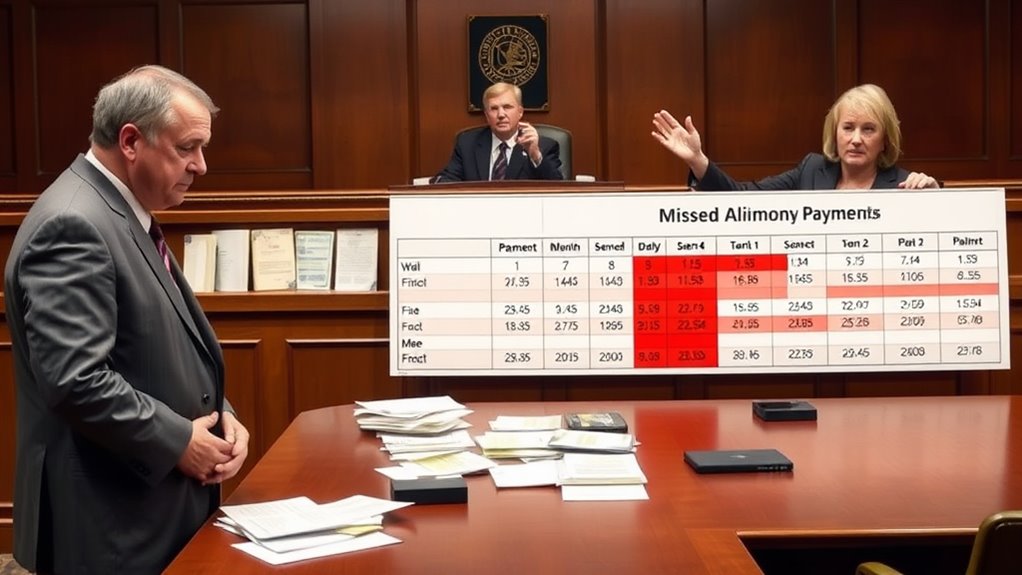Alimony noncompliance can indeed be enforced through various legal mechanisms. Courts have several tools at their disposal, such as wage garnishment, property liens, and contempt of court proceedings. These methods guarantee that recipients receive the financial support they require after divorce. Noncompliance may lead to serious consequences, including legal penalties and damage to credit scores. Understanding these enforcement options is vital for individuals seeking compliance and justice in alimony matters, which can be explored further.
Key Takeaways
- Yes, alimony noncompliance can be enforced through various legal mechanisms established by state laws.
- Courts can implement wage garnishment to automatically deduct payments from the noncompliant party’s paycheck.
- Property liens can be placed on assets to secure unpaid alimony, ensuring the recipient’s financial rights.
- Contempt of court proceedings may be initiated against individuals who fail to comply with alimony orders.
- Alternative dispute resolution methods like mediation can help resolve disputes and encourage compliance outside of courtroom settings.
Understanding Alimony: Definition and Purpose

Alimony, often characterized as a financial support mechanism post-divorce, serves a critical role in addressing the economic disparities that can arise from the dissolution of marriage. This spousal support aims to guarantee that both parties can maintain a semblance of their previous standard of living. Alimony calculations typically consider various factors, such as the length of the marriage, the financial needs of the receiving spouse, and the paying spouse’s ability to provide support. Understanding these elements is essential for individuals maneuvering the complexities of post-divorce finances, as equitable agreements can foster healing and stability. Ultimately, alimony not only reflects the commitment once shared but also underscores the importance of fairness in adapting to separate lives. In some cases, ensuring compliance with alimony agreements may require professional help in child custody battles to address related financial disputes effectively.
Types of Alimony Agreements
Various types of alimony agreements exist to accommodate the diverse financial situations and needs of individuals following a divorce. Among these, temporary alimony serves as a short-term solution, providing financial support during the divorce proceedings or until a final settlement is reached. This type is vital for individuals who may struggle to maintain their standard of living during the change. On the other hand, rehabilitative alimony is designed to support a spouse in gaining skills or education necessary for self-sufficiency post-divorce. This agreement acknowledges the importance of empowering individuals to become financially independent, reflecting a compassionate approach to alimony that considers both immediate needs and future aspirations. Understanding these options is essential for informed decision-making in divorce proceedings. Additionally, proof of cohabitation may affect alimony payments if a former spouse begins living with another individual.
Legal Framework for Alimony Enforcement
While the emotional and financial complexities of divorce can often cloud judgment, understanding the legal framework for alimony enforcement is essential for ensuring compliance and protecting the rights of both parties. Alimony laws vary by jurisdiction, establishing the obligations of the paying spouse and the rights of the recipient. Enforcement mechanisms include wage garnishment, property liens, and contempt of court proceedings, which serve to uphold the court’s decisions. Additionally, states may impose penalties on noncompliant individuals, reinforcing the seriousness of adherence. Familiarity with these legal structures not only empowers individuals to seek justice but also fosters a sense of security, allowing both parties to move forward with their lives while fulfilling their responsibilities as mandated by the law. Furthermore, having a clear understanding of evidence collection can significantly aid in resolving disputes over alimony compliance.
Common Reasons for Alimony Noncompliance

Noncompliance with alimony obligations can often stem from a variety of factors that reflect the complexities of individual circumstances. Understanding these reasons is essential in addressing the issue effectively:
- Financial hardships: Sudden job loss or unexpected expenses can hinder the ability to meet payments.
- Communication issues: Lack of dialogue between parties can lead to misunderstandings and perceived injustices in alimony arrangements.
- Emotional distress: The aftermath of divorce can leave individuals overwhelmed, affecting their focus on financial commitments.
- Disputes over terms: Conflicting interpretations of alimony agreements may result in noncompliance, as one party feels wronged or misled.
Additionally, independent verification of any claims regarding financial difficulties can provide a clearer picture of the situation, which is crucial for resolving disputes.
These factors illustrate the intricacies that can contribute to alimony noncompliance, emphasizing the need for open communication and understanding in such sensitive matters.
Consequences of Failing to Pay Alimony
Failing to pay alimony can lead to significant legal ramifications, including court-ordered penalties for noncompliance. Additionally, the financial implications extend to one’s credit score, which may suffer as a result of unpaid obligations. Enforcement measures, such as wage garnishments and property liens, further illustrate the serious consequences of neglecting alimony responsibilities. Furthermore, seeking assistance from a private investigator can provide valuable support in cases of child custody issues related to alimony disputes.
Legal Penalties for Nonpayment
A significant number of individuals who are obligated to pay alimony may underestimate the legal repercussions associated with nonpayment. Ignoring these legal obligations can lead to severe consequences, including:
- Wage garnishment: Direct deductions from paychecks to cover missed payments.
- Contempt of court: Legal action that may result in fines or even jail time.
- Seizure of assets: Courts may allow for the seizure of property or bank accounts.
- Increased financial penalties: Additional fees may accrue, further complicating financial situations.
Such penalties are designed not only to enforce compliance but also to underscore the seriousness of alimony agreements. Understanding these potential ramifications is vital for anyone facing alimony obligations, as the financial penalties can become overwhelming and detrimental.
Impact on Credit Score
Consequences of neglecting alimony obligations extend beyond legal penalties, considerably impacting an individual’s credit score. When payments are missed, the default can be reported to credit bureaus, leading to negative entries on a credit report. Such entries diminish creditworthiness, making it challenging to secure loans or favorable interest rates in the future. The financial implications are significant; a poor credit score can hinder employment opportunities, as many employers review credit histories during the hiring process. Additionally, individuals may face higher insurance premiums and difficulty renting homes. Consequently, maintaining compliance with alimony obligations is not only a legal responsibility but a crucial component of preserving one’s financial integrity and future opportunities.
Enforcement Through Court Orders
Court orders serve as a critical mechanism for enforcing alimony obligations, ensuring that payments are made in accordance with legal requirements. When individuals fail to comply with court orders, various consequences can arise, emphasizing the importance of court order compliance. Alimony enforcement strategies may include:
- Wage garnishment, directly deducting payments from the payer’s paycheck
- Contempt of court proceedings, compelling the noncompliant spouse to explain their failure to pay
- Property liens, placing a legal claim on the individual’s assets until payments are settled
- License suspensions, restricting the individual’s professional or driving privileges
These mechanisms not only highlight the serious implications of noncompliance but also underscore the judicial system’s commitment to upholding financial responsibilities established through court orders.
Legal Remedies for Enforcing Alimony Payments
Legal remedies for enforcing alimony payments are essential tools for ensuring compliance and protecting the rights of recipients. Courts offer various enforcement options, including the potential for holding noncompliant payers in contempt of court. Understanding these mechanisms can empower individuals to seek the financial support mandated by their divorce agreements. Engaging a private investigator can also uncover hidden assets that may assist in securing the owed payments.
Court Enforcement Options
Enforcing alimony payments can often become a complex legal battle, necessitating a range of court enforcement options for the aggrieved party. These enforcement strategies can help guarantee that obligations are met through established court procedures, fostering a sense of security and fairness.
- Wage garnishment: Automatically deducting payments from the noncompliant party’s paycheck.
- Property liens: Placing legal claims on assets to secure unpaid alimony.
- Contempt proceedings: Seeking judicial intervention for noncompliance, compelling adherence to obligations.
- Seizure of tax refunds: Capturing tax returns to offset unpaid alimony.
Contempt of Court
Contempt of court serves as a powerful mechanism for ensuring compliance with alimony obligations, compelling noncompliant parties to adhere to their financial responsibilities. When a spouse fails to make required payments, contempt proceedings can be initiated to address the violation. This legal action underscores the seriousness of disregarding court-ordered support, often resulting in court sanctions that may include fines or even jail time. Such consequences highlight the judiciary’s commitment to upholding financial agreements made during divorce proceedings. By invoking contempt of court, the aggrieved party not only seeks justice but also reinforces the importance of accountability in personal relationships. Ultimately, this legal remedy serves as a deterrent against alimony noncompliance, fostering a sense of responsibility among ex-spouses.
Role of Courts in Alimony Enforcement
While alimony agreements are designed to provide financial support to a former spouse, the efficacy of these arrangements often hinges on the role of the courts in enforcing compliance. Courts possess the authority to uphold these agreements through various enforcement procedures, ensuring that noncompliance does not go unaddressed.
- Issuing wage garnishments to secure payment
- Imposing penalties for contempt of court
- Mandating payment plans for the delinquent spouse
- Facilitating hearings to assess financial capability
These judicial actions serve as powerful reminders that the legal system is committed to protecting the financial rights of individuals. By actively engaging in enforcement, courts not only uphold agreements but also foster a sense of accountability, ultimately reinforcing the importance of financial support in pivotal life phases. Additionally, courts may also rely on private investigators to gather evidence of noncompliance, enhancing the enforcement process.
Mediation and Alternative Dispute Resolution

Mediation and alternative dispute resolution (ADR) offer a constructive pathway for resolving alimony disputes outside of traditional court settings, allowing parties to engage in dialogue and negotiate terms that are mutually beneficial. Utilizing effective mediation techniques, such as active listening and collaborative problem-solving, can foster an environment where both parties feel valued and understood. This approach not only promotes open communication but also encourages creative solutions tailored to individual circumstances. By prioritizing amicable dispute resolution, parties may find it easier to reach agreements that are sustainable and respectful, ultimately reducing the likelihood of future noncompliance. Embracing mediation and ADR can transform contentious disputes into cooperative negotiations, markedly enhancing emotional well-being and maintaining relationships post-separation. Furthermore, incorporating the guidance of private investigators can provide valuable insights and evidence to support fair negotiations and ensure compliance with agreements.
Preventing Alimony Noncompliance: Best Practices
How can parties effectively minimize the risk of alimony noncompliance? Implementing best practices guarantees a smoother financial shift post-divorce.
- Establish a clear alimony schedule outlining payment dates and amounts.
- Utilize alimony tracking tools for accurate record-keeping.
- Set up payment reminders to prompt timely transactions.
- Maintain open communication to address concerns proactively.
- Engaging a private investigator can provide crucial insights into compliance issues, ensuring that any discrepancies are addressed promptly.
Frequently Asked Questions
Can Alimony Payments Be Modified After the Divorce Is Finalized?
Alimony payments can indeed be modified post-divorce. The alimony modification process considers various factors influencing modifications, such as changes in financial circumstances or the recipient’s needs, ensuring fairness for both parties involved in the arrangement.
What Happens if the Payer Becomes Unemployed?
When the payer becomes unemployed, the unemployment impact can greatly alter their financial obligations. Courts may reassess the situation, potentially modifying alimony arrangements to reflect new realities, ensuring fairness and adherence to evolving economic circumstances.
Is There a Statute of Limitations for Collecting Unpaid Alimony?
Alimony enforcement laws vary by jurisdiction, often imposing a statute of limitations on collecting unpaid alimony. Understanding these limitations is essential, as unpaid alimony consequences can greatly impact financial stability and future obligations for both parties involved.
Can Alimony Be Enforced Across State Lines?
Interstate alimony enforcement presents jurisdictional challenges, complicating the collection process. Courts may struggle to assert authority over noncompliant parties residing in different states, necessitating a nuanced understanding of laws governing cross-border alimony obligations and enforcement mechanisms.
What Documentation Is Needed to Prove Alimony Noncompliance?
To demonstrate alimony noncompliance, one must gather essential documentation, including payment records, correspondence, and court orders. These evidence types fulfill proof requirements, establishing a compelling case for enforcement in legal proceedings.
Conclusion
In summary, alimony noncompliance poses significant challenges for recipients relying on these payments for financial stability. Understanding the legal frameworks and available remedies is essential for enforcing compliance. Courts play an important role in upholding alimony agreements, and alternative dispute resolution methods can offer more amicable solutions. By implementing best practices, both parties can work towards preventing noncompliance, ensuring that the intent of alimony—to provide support and stability—remains effectively upheld in the face of potential disputes.






